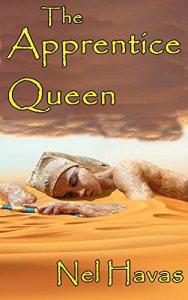
The Apprentice Queen is a story about how an ordinary person becomes a monster.
Mitti grew up in a happy, not particularly well-off family in ancient Egypt. When she was ten, she found herself suddenly whisked off into the royal court, a snake pit of deception, betrayal, and political games. She is trained by the queen herself to become an expert at maneuvering in this toxic environment. Mitti is horrified by Queen Sekma's callousness, her willingness to sacrifice innocent people for the greater good, or even just to further her own power. But as Mitti becomes the princess Kham, she develops an aptitude for the same manipulation that she always resented in Sekma. Eventually she finds herself making an impossible choice between her beloved and the safety of both her son and the kingdom.
I found The Apprentice Queen to be a little overwhelming at first: we are plunged into this story and have to quickly find our feet. The novel also bounces back and forth in time often, usually beginning a chapter with a dramatic scene and then backing up to explain what lead up to it. I was immediately intrigued by the world of court politics, however. The intricate machinations are fascinating to read about. At its heart, this is about how Kham becomes corrupted by her environment, or at least how she is forced to make impossible choices. As a child, Mitti is horrified to realize that on some level she in enjoying this intrigue and manipulation, and I felt the same way reading it. The options are laid out so that something like sentencing a person to death for a minor offense can seem reasonable while I'm immersed the story, and it only after I've put the book down that I realize how reprehensible it is.
Sekma makes for a fascinating character. She is brutal, but incredibly intelligent and skilled. Relentlessly practical, she has a clear worldview and is willing to sacrifice anything in order to make the kingdom stronger. She sneers at the idea that war has "honor" over poisoning a single person in order to prevent thousands of deaths on the battlefield. Kham struggles with her own feelings towards Sekma, loathing her at most times, but growing to respect her as she struggled to fill the old queen's shoes.
It is Kham's relationships with the key women in her life that form the core of the emotional arc of the story. Although she is motivated by the love she has for her son, he does not demand the attention that Sekma, Nyserra, and even her sometimes lover Tasima do. I loved the rapport that Tasima and Kham had together as friends and lovers while not in the context of a romantic relationship. It's also always nice to have a story that integrates lesbian relationships seamlessly. This isn't a "lesbian romance", but it does include one.
I did feel uncomfortable about the attitudes around disability. Although I liked that Kham and her husband had a friendly relationship, most of the discussion around people with disabilities in this novel is about preventing their existence. At some point Kham contemplates what a "miserable" existence Oskhama, though we never have any indication that he is unhappy.
Aside from that, I did have some minor quibbles, including a few typos and that one of the sex scenes has one of the women say "Stop! Oh Stop!" to no response, though clearly the scene is supposed to read as consensual. Other than that, the writing is serviceable and communicates an engrossing narrative of one person's gradual transformation into someone remarkably like the person they most detest. This conceit is captivating and so well executed that I would definitely recommend picking this up regardless of the minor flaws I found with it.
This has been a sponsored review. For more information, check out the Lesbrary's review policy.